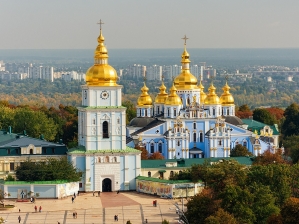
A Ukrainian priest abducted by Russian occupiers nearly a year ago could face 12 years in prison after a secret court trial for alleged espionage, contrary to international law, according to rights watchdog Forum 18.
The Rev. Kostiantyn Maksimov, 40, from the Ukrainian Orthodox Church (UOC) was charged with espionage under Article 276 of the Russian Criminal Code. The Russian Prosecutor’s Office in occupied Zaporizhzhia announced the trial on its website on March 29.
The prosecutor’s office alleges, without evidence according to Forum 18, that Maksimov used “an internet messenger transmitted to an employee of the Ukrainian security service information with the coordinates of the deployment of Russian air defense technical equipment located in the city and district” between April 2022 and February 2023.
Before his arrest, Maksimov was a Ukrainian orthodox priest at the Church of the Assumption of the Blessed Virgin Mary, in Tokmak city, in Zaporizhzhia, now under Russian occupation.
Russian forces stopped and detained the priest in Chongar town in May. At the time, he tried to cross the boundary line with occupied Crimea. No one had knowledge of the priest’s welfare since the initial arrest 10 months ago until the announcement of the trial.
Pro-Russian politician Vladimir Rogov pronounced a guilty verdict regardless of the trial’s outcome on his Telegram channel on March 31.
“The accomplice of the Ukrainian special services was caught transferring confidential data to his overseers in Kyiv,” Rogov wrote of Maksimov, according to Forum 18. “The information leak threatened the security of Russia and all residents of the Zaporizhzhia Region.”
Forum 18 stated that the trial is illegal under international law because an occupying country is not allowed to enforce its own laws in occupied territory. The laws of occupation verified by several countries, including Russia, at The Hague on Oct. 18, 1907, appear to support this view. Article 43 states that when the authority of a “legitimate power” is passed to an occupier, it should be “respecting, unless absolutely prevented, of the laws in force in the country.”
No further details are known about a trial date or lawyers involved with the priest, despite Forum 18’s repeated approaches to Russian authorities. An unnamed official at the Zaporizhzhia Region Prosecutor’s Office refused to give details to Forum 18 about the trial date, prosecutor’s name, name of the judge, or Maksimov’s location.
The official said the office had “many cases” but “of course” the priest had a lawyer, though he had no further information about the attorney.
“We have no greater rights than the defense side,” the official told Forum 18. “Everything will be decided by the court.”
Russian occupiers disagree about the exact location of Maksimov’s trial. The court hearing is at the Russian Zaporizhzhia Regional Court in Melitopol, according to Zaporizhzhia Region Prosecutor’s Office.
The Crimean Supreme Court in Simferopol, however, is the real location, according to Yelena Shapovalova, head of the Bar Association in the Russian-occupied part of Zaporizhzhia Region. No trial notification appeared on the Crimean Supreme Court’s website as of this writing.
Shapovalova declined to tell Forum 18 the name of Maksimov’s appointed lawyer during the pre-trial investigation.
“That period has now ended, and the lawyer’s work thus came to an end,” she reportedly said from her office in Melitopol on Monday (April 8).
Shapovalova confirmed that none of the priest’s relatives signed an agreement with a lawyer. She also revealed that Maksimov had been at a temporary holding center in Melitopol during the pre-trial investigation. There was no indication of his present whereabouts.
The Rev. Vladimir Saviisky, another priest from the Ukrainian Orthodox Church, knew Maksimov personally and called news of the secret court trial, “terrible.”
“This was to be expected,” he told Forum 18. “The Russians threatened me with this also. Had they not deported me, I would have been sitting next to him in a prison cell.”
Saviisky reportedly endured pressure from Russian occupiers to support the Russian Orthodox Church’s dominance of the Ukrainian Orthodox Church’s Berdyansk Diocese.
He served as priest of St. Nicholas Church in Primorsk, an occupied town near the Azov Sea in Zaporizhzhya. Saviisky refused to sign his church over to the Russian Orthodox Church, despite several interrogations, and fled to Ukrainian-controlled territory in June.
Artyom Sharlay, head of the Religious Organizations Department at Zaporizhzhia Regional Administration’s Social and Political Communications and Information Policy Department, made unverified claims about Maksimov to Forum 18 in October 2023.
He said the priest opposed the Berdyansk Diocese of the Ukrainian Orthodox Church being linked to the Russian Orthodox Church, which has controlled the Diocese since May 2023.
Christian Daily International has previously reported on the plight of Ukranian Orthodox priests suffering in Russian occupied parts of Ukraine.





